Delving into a world of Dickensian tragedies, Proustian reflections, Hitchcockian suspense and Kubrickian precision.
Don't wanna be here? Send us removal request.
Text
About Time, 2013
A Life-Affirming Movie Experience
About Time is a time-traveling romantic dramedy written and directed by British filmmaker Richard Curtis. Known for his heartwarming narratives in Notting Hill and Love Actually, this film is Curtis through and through. With About Time, he may have crafted his most resonant and introspective work yet.
The story follows Tim (Domhnall Gleeson), who upon turning 21, learns a family secret from his father (Bill Nighy): the men in their family can travel through time. Tim resolves to improve his life by getting a girlfriend, which turns out to be more challenging than he expected.
Richard Curtis usually has this homely sense to his films, where you feel part of the story. About Time really feels like a warm hug. Each rewatch of the film provides me with a sense of comfort and contentment. It challenges us to rethink our relationships with loved ones and reminds us that an ordinary life filled with love and gratitude is what truly matters in the end.
The film may not appeal to everyone, but it doesn't need to. It isn’t a film that strives for universal acclaim. It’s one of those films that go beyond the usual bounds of film criticism. The film's purpose lies not in perfecting the science of time travel, but in using it as a powerful allegory for the human condition and the complexities of our relationships.
The film's pacing and buildup toward its pivotal moments—especially in the last act—are handled wonderfully and really elevate the film. I believe About Time is one of the most underappreciated films of its time, hitting all the right emotional notes and leaving a lasting impact on those who experience it.
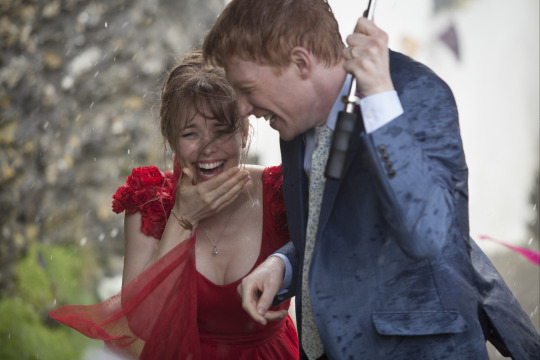




#about time#domnhall gleeson#bill nighy#rachel mcadams#film#cinema#film stills#film review#movie review#romcom#romantic#richard curtis
2 notes
·
View notes
Text
A Man Escaped, 1956
“I’d rather people feel a film before understanding it.” — Robert Bresson
A Man Escaped (Un condamné à mort s'est échappé) is one of the finest prison escape films, masterfully executed with suspense that grips the viewer from start to finish. Few films have made me feel so strongly for the characters.
Bresson’s minimalist masterpiece tells the story of a French Resistance fighter imprisoned by the Nazis, based on the real-life memoir of André Devigny, a prisoner in Montluc prison in Lyon in 1943. This notorious prison was used by the Gestapo to detain and punish captured resistance members and Jews. Significantly, Bresson himself had been a prisoner during World War II.
“I was able to call on my experience as a prisoner of war. My impressions, my sensations, how I felt interacting with my German guards and jailers—I tried to put it all in the film.” – Robert Bresson.
Bresson is inventive, precise, and uncompromising. His use of fragmented frames and tightly focused shots suspends time, creating incredible tension. There is no soundtrack, only concise manipulation of sound with the imagery. There are no acclaimed actors, choosing realism over performance. Every scene is essential, characterized by simplicity and economy, yet delivering profound ideas and emotions. No wonder that A Man Escaped still remains a pinnacle of French cinema. Jean-Luc Godard once said of Bresson: "He is to French cinema what Dostoyevsky is to the Russian novel."
You might wonder, why should we watch a film released 68 years ago? I believe, in any art form, you must study the masters of the past if you want to further your understanding in your own time. The more you allow yourself to watch and enjoy the works of the old masters, the more inspiration you will have to draw from. At the same time, for all the aspiring filmmakers, it’s important to have interests beyond the artform of cinema or you will just continue to make derivative work.
The "movie brats" of the 70s—Spielberg, Coppola, Scorsese, De Palma—studied films from the 30s, 40s, and 50s before they could produce the groundbreaking work they did. In a career spanning more than 40 years, Bresson completed only 13 feature films, yet each one is an artistic triumph. Of all his films, A Man Escaped should be required viewing for film students and cinephiles alike.







#robert bresson#a man escaped#Un condamné à mort s'est échappé#cinema#film#bnw film#film stills#film review#art#french cinema#prison film#movie review#movie brats#jean luc godard#André devigny
3 notes
·
View notes
Text
The VVitch, 2015
Wouldst thou like to live deliciously?
Robert Eggers has crafted a bleak and hypnotic folk horror film that is meticulous in its historical accuracy, fascinating in its low-lit cinematography, and undeniably unique in its cinematic experience.
Eggers' masterful directorial debut is set 62 years before the infamous “Salem Witch Trials”, in colonial Massachusetts, exploring America's first witch hysteria. What sets Eggers apart from most directors in the horror genre is his commitment to authenticity. Much of the film's dialogue and story are drawn directly from writings of the period, and the film was shot primarily with available and natural light. Eggers shows an excellent understanding of the era’s psychological complexities and cultural realities, which is brought to life through remarkable performances from Anya Taylor-Joy, Ralph Ineson, and Kate Dickie.
The VVitch delves into themes such as faith, religion, hypocrisy, familial trauma, and, of course, the supernatural. The film’s subtle, suspenseful terror is both deeply unsettling and incredibly rewarding, particularly for horror fans who crave intelligent, well-crafted films in the genre.


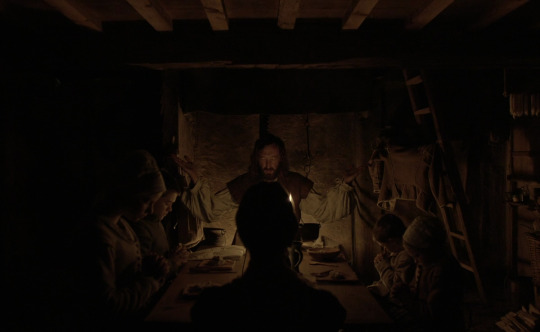


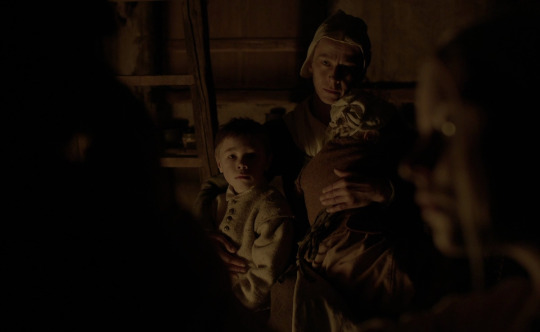

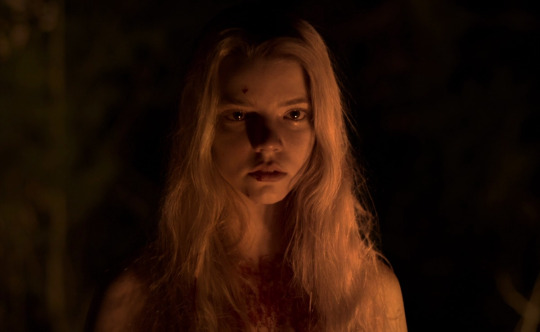
#the vvitch#cinema#film#film stills#film review#movie review#movies#horror#witchcraft#black phillip#satanism#witches#indie#a24 films#a24#anya taylor joy#ralph ineson#robert eggers#art#horror fan#horror family
12 notes
·
View notes
Text
Frances Ha, 2012
Raw, obscure, and wonderfully humane.
Noah Baumbach has crafted an authentic, delightful, and relatable character study, clearly inspired by French New Wave cinema and films like Annie Hall and Manhattan. According to Baumbach, the decision to shoot the film in black and white was meant to "boil it down to its barest bones," creating an immediate sense of "history" and "a kind of instant nostalgia." Greta Gerwig, who co-wrote the film with Baumbach, appears in every scene and plays the character of Frances—a carefree, charming, yet deeply flawed individual living in New York.
At some point in our lives, we've all been Frances, because life can be so uncertain and ambiguous. We've all been confused, broke, awkward, spontaneous, and just… clumsy. We cannot fully know or understand many things in life, and we often steer blindly, unsure of what we truly want. Baumbach’s film reminds us that failures and disappointments are integral to our human experience, and that life often doesn't go according to plan—and that’s perfectly okay.
As I finish this review, I’ll leave you with a question: Do you think your ability to cope with life’s challenges has been better than what your past had traditionally led you to believe?






#frances ha#noah baumbach#greta gerwig#cinema#film stills#film#film review#movie review#films#movies#art#black and white#new york#indie cinema#existence#life#french new wave#annie hall
2 notes
·
View notes
Text
Cinema Paradiso, 1988
Cinema is Life, and Life is Cinema
Cinema Paradiso is a film about the magic of cinema and one that is closest to my heart. This nostalgic coming-of-age story explores the relationship between Toto (Salvatore Cascio) and Alfredo (Philippe Noiret), the cinema projectionist in the small Sicilian town of Giancaldo in the years following World War II. The narrative unfolds in flashback from Toto's point of view, structured around three stages of his life: childhood, adolescence, and adulthood. Directed with a great heart by Giuseppe Tornatore, the story is drawn from his childhood memories and was shot in Bagheria, Sicily, his hometown. The film went on to win several awards, including the 1989 Oscar for Best Foreign Language Film.
Many people attribute this film to igniting their cinephile journey, which is true for me as well. At its core, Cinema Paradiso is about love—love for family and love for cinema. It captures what cinema meant as a collective social experience and serves as a poignant reminder of why we fell in love with it in the first place. It is one of those rare films that can genuinely be described as cathartic. While many people visit Sicily for their love of The Godfather—a trip that’s certainly on my bucket list—I also wish to visit the place for Cinema Paradiso.
Widely considered one of the best Italian films ever made, the film features incredible performances by Philippe Noiret, Salvatore Cascio, Marco Leonardi, Jacques Perrin, and Pupella Maggio. Not to mention, the exquisite musical score by Ennio Morricone is one for the ages and will remain etched in my heart forever.
As with every piece of entertainment, Cinema Paradiso eventually comes to an end, and it does so in the most soul-stirring way possible. While finishing this review, I can’t help but ask myself: Will any film ever make me feel this way again?







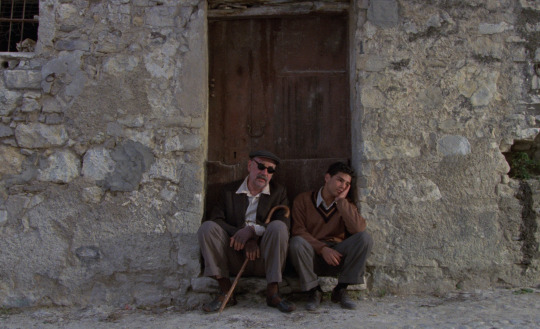


#cinema paradiso#giuseppe tornatore#jacques perrin#salvatore cascio#Phillippe Noiret#cinema#film#films#film stills#film review#movie review#art#movies#80s movies#Italian#italian cinema#ennio morricone#coming of age#academy award winner#sicily#sicilia#italy
11 notes
·
View notes
Text
Amadeus, 1984
The man, the music, the madness.
Amadeus is one of those films that leaves you in a profound, meditative state for a day or two. I don’t think I will ever be able to fully articulate the kind of impact it had on me or do proper justice to its review.
Miloš Forman’s widely celebrated masterpiece details the rivalry between composers Wolfgang Amadeus Mozart and Antonio Salieri. Every moment of this film deserves praise. It is not intended to be a biopic, as it’s based on the play Amadeus by Peter Shaffer, which in turn was inspired by the 1830 play Mozart and Salieri by Russian poet Alexander Pushkin. Shaffer even called it "a fantasia on the life of Mozart and Salieri." The play uses a rumor to explore the nature of providence and the tragedy of being consumed by envy.
Amadeus is a three-hour-long odyssey that seems to fly by, made all the more remarkable by the fact that the camera rarely moves. Forman has crafted a magnetic film, with soaring music (by Mozart, of course) placed immaculately, matched only by impeccable performances from Tom Hulce and Elizabeth Berridge, with F. Murray Abraham shining the brightest. The film serves as a cautionary tale and an incredible dialectic on envy, faith, power, and finding joy in life by not raging against things you cannot truly change.
Mozart's nickname, "Amadeus," in Latin means "God's beloved." This is the central theme of the film, as Salieri believes Mozart's music is so perfect that the only explanation is that Mozart is merely a vessel for God, who is truly composing the music, or that God bestowed this ultimate talent upon Mozart. Finally, the most incredible and mind-boggling thing about Mozart is that he was even better than what is portrayed in the film.
The film earned 11 Academy Award nominations, winning 8 Oscars, including Best Picture, Art Direction, Costume Design, Directing, Makeup, Sound, Shaffer’s Adapted Screenplay, and Best Actor for F. Murray Abraham.




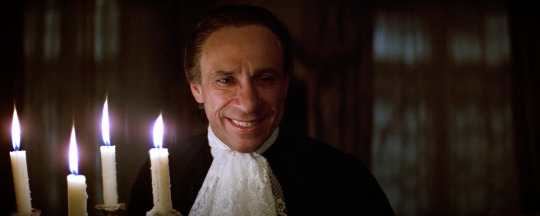
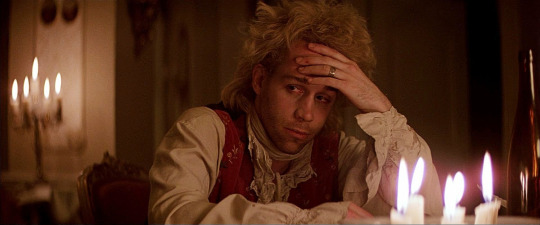
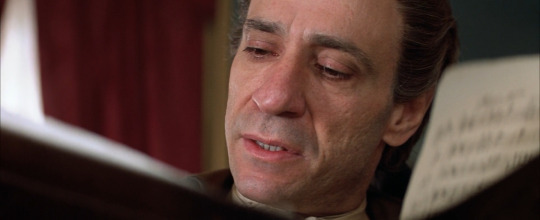
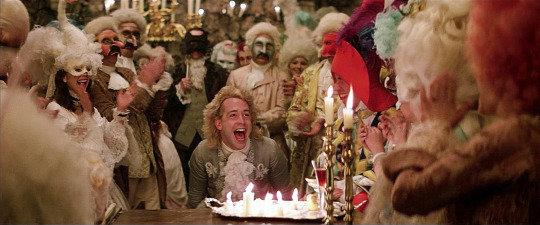
#amadeus#mozart#antonio salieri#film#cinema#film stills#film review#movie review#movies#art#masterpiece#milos forman#oscars#academy awards#academy award winner#tom hulce#f murray abraham#elizabeth berridge#18th century#music#musical#opera#symphony#don giovanni#requiem in d minor#classical music
8 notes
·
View notes
Text
Memoria, 2021
Beautiful, strangely unsettling and hypnotically-paced.
A Scottish woman, Jessica (Tilda Swinton), after hearing a loud 'bang', begins experiencing a mysterious sensory syndrome while traversing the jungles of Colombia.
Apichatpong's abstract and contemplative filmography is essentially like looking at a screen for a long stretch of time, similar to how one would look at a painting in an art gallery, trying to soak in as much information as possible. It certainly might not be for everyone, but I believe Memoria is a metaphysical, poetic journey across space and time that will certainly leave a mark on you.
Such a shame I couldn't experience it in a theatre, which would've been a form of group meditation.




#memoria#tilda swinton#apichatpong weerasethakul#apichatpong#colombia#cinema#film#sound#film stills#film review#movie review#films#art#mubi#movies
12 notes
·
View notes
Text
Roma, 2018
The most profound portrayal of human experience I've ever seen on film.
Roma is a black and white art film which is also a highly personal project by Alfonso Cuarón that features the perspective of Cleo (Yalitza Aparicio), a domestic servant working for a middle-class family – a character based on the Cuarón's family servant, Lobi.
Cuarón has done a marvelous job taking his childhood and adapting it for the big screen. He also stated that ninety percent of the scenes represented in the film are the scenes taken out of his memory. He went on to win the Golden Lion at the 2018 Venice International Film Festival.
Yalitza Aparicio became the first indigenous woman from the Americas (and only the second Mexican woman) to receive an Oscar nomination for Best Actress for her role.



#roma#film#cinema#film stills#film review#movie review#movies#films#alfonso cuaron#venice international film festival#mexican#spanish#mexico#1970s#yalitza aparicio
3 notes
·
View notes
Text
Godzilla Minus One, 2023
Never thought they could make a Godzilla film with so much heart. Humane, terrifying and unbelievably awe-inspiring.



#film#cinema#film stills#godzila#godzilla minus one#film review#japanese#kaiju#violence#art#takashi yamazaki#minami hamabe#yuki yamada#japan
5 notes
·
View notes
Text
Gamak Ghar, 2020
Every single frame can be a painting or a photograph. A visual masterpiece that instills wonder, nostalgia, and melancholy.
Thank you, Achal Mishra.




#cinema#film#indian cinema#indian#gamak ghar#art#film stills#films#film review#movie review#movies#achal mishra#nostalgia
9 notes
·
View notes
Text
Kairo, 2001
Watched the Japanese techno-horror film: Kairo (aka Pulse), directed by Kiyoshi Kurosawa. It is pretty absurd but definitely one of the scariest films I've ever watched! One particular scene was SO terrifying that my eyes were all watery with a sense of dread.




11 notes
·
View notes
Text
Oddity, 2024



1 note
·
View note
Text
Punch-Drunk Love, 2002
I have so much strength in me, you have no idea
I have a love in my life
It makes me stronger than anything you can imagine.

#punch drunk love#adam sandler#paul thomas anderson#pta#cinema#films#film#film stills#romance#comedy#emily watson#philip seymour hoffman#movie review#film review#filmmaker#cinephile#lovers#love#couple
2 notes
·
View notes
Text
Afternoon Clouds, 2017
Poetic, tender... Proustian.


Directed by Payal Kapadia
#afternoon clouds#payal kapadia#short film#cannes film festival#cannes#films#film#auteur#cinema#film stills
3 notes
·
View notes
Text
Barry Lyndon, 1975
Every frame is a painting, applies to very few films, and Stanley Kubrick's Barry Lyndon is one of them. A visual tour de force. Mysterious, innovative and deceptively simple. Nobody does it like Kubrick.




#cinema#stanley kubrick#barry lyndon#film#film stills#painting#kubrick movie#film review#frame#classic
7 notes
·
View notes
Text
The Batman, 2022
Matt Reeves has masterfully crafted a proper crime thriller and just like Zodiac, Prisoners and Se7en, I immediately wanted to re-watch this one. Refreshing to see satisfying and self-contained storytelling in the DC universe. Robert Pattinson is THE CHOSEN ONE. Paul Dano understood his assignment.


#the batman#matt reeves#colin farrell#zoe kravitz#robert pattinson#paul dano#the riddler#dc comics#cinema#film#film stills#films#film review#movie review#movies#batman#the dark knight
10 notes
·
View notes
Text
Oppenheimer, 2022
A behemoth of a film that I consider to be Nolan’s magnum opus—one of my favorites, with possibly one of the greatest and most terrifying endings of all time.
I'm hoping that the film's 100-day theatrical window will empower other filmmakers to showcase their art in its truest form. Studios can also finally veer away from superhero (amusement park) mediocrity and embrace a new era of cinema rooted in truth and real life experiences.


#oppenheimer#robert downey jr#cilian murphy#emily blunt#matt damon#films#cinema#christopher nolan#nolan#world war 2#josh hartnett#florence pugh#benny safdie#jack quaid#rami malek#kenneth branagh
0 notes